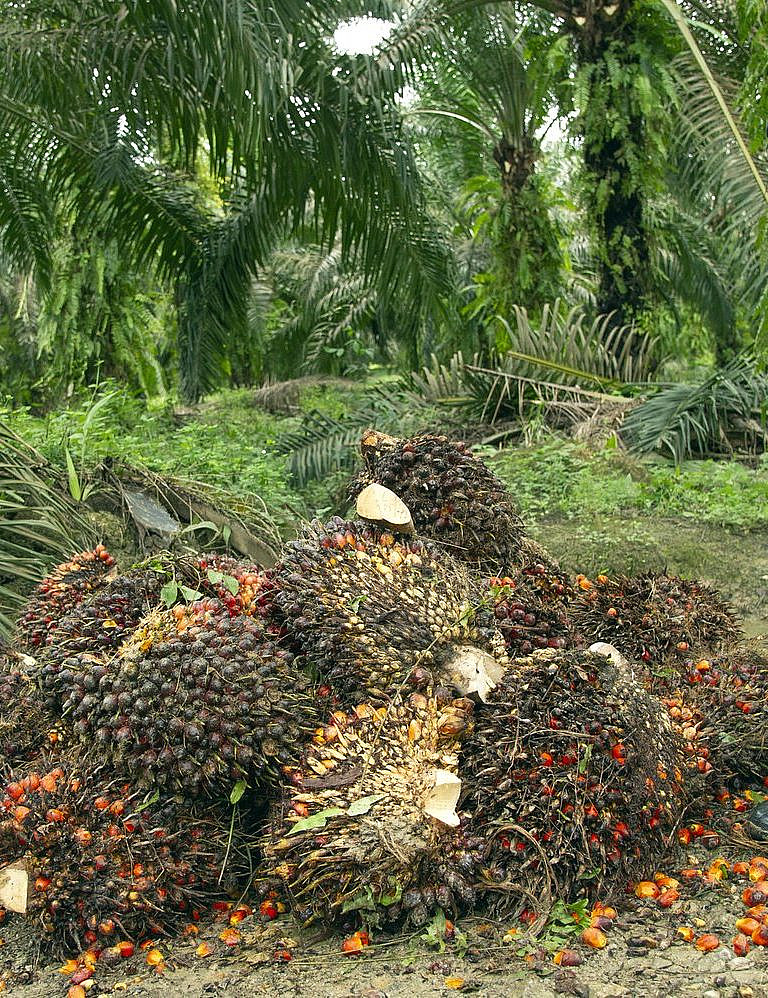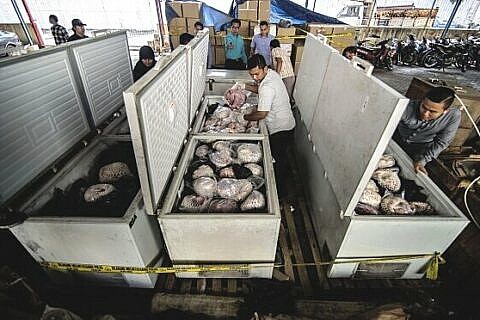Spoiled Fruit

C4ADS analysis shows that the food conglomerates that feed millions—including giants such as Nestlé and Cargill—continue to enable forced labor through their indiscriminate import of tainted palm oil.
The production of palm oil has long been reliant on deforestation and forced labor. These realities have spurred transparency initiatives, responsible sourcing certifications, and even import restrictions. Still, C4ADS analysis shows that the food conglomerates that feed millions—including giants such as Nestlé and Cargill—continue to enable forced labor through their indiscriminate import of tainted palm oil. In particular, the Malaysian company Sime Darby Plantation Berhad—part of the larger Sime Darby conglomerate—has remained part of global supply chains despite substantial public reporting and US enforcement of its use of forced labor.
Sime Darby’s Human Rights Record #
Palm oil is a cheap and ubiquitous ingredient used in food, cosmetics, and fuel, but it comes at a steep social and environmental cost. A growing expanse of palm oil-producing plantations is only possible through mass deforestation, which releases carbon dioxide into the atmosphere and destroys the habitats of endangered animals, such as orangutans, elephants, and tigers. Moreover, palm oil plantations often rely on exploitative working and living conditions, including forced labor. While coercive and degrading conditions are widespread across the palm oil industry, in this case study we examine Sime Darby, a Malaysian company that is one of the world’s largest palm oil producers.
While reporting and enforcement have linked Sime Darby’s activities in Malaysia to forced labor, the company’s ties to human rights violations begin further afield. The entangled nature of palm oil supply chains means that even though Sime Darby produces its own palm oil, it also sources from other companies and plantations, creating another avenue for oil tainted by deforestation, forced labor, and other human rights abuses taking place throughout the industry to enter Sime Darby’s global supply chains. However, despite increased efforts toward transparency in palm oil supply chains, these connections are not always easy to trace. To overcome this challenge, C4ADS developed the C4ADS Palm Oil Supplier List, which compiles the traceability-to-mill lists published by twelve major international commodity traders, including Sime Darby. Using this data, C4ADS connected Sime Darby to the far-flung palm mills that ultimately supply it.
One such palm mill is owned by NaturAceites, S.A., a Guatemalan palm oil company. According to reporting by Al Jazeera, NaturAceites has installed palm oil plantations on land claimed by the Q’eqchi’, a Mayan indigenous community in Guatemala’s Izabal Department. In October 2020, NaturAceites took legal action to evict Q’eqchi’ households from the disputed land. During the eviction operation, a member of the Q’eqchi’ community was reportedly killed by Guatemalan police. According to the reporting, Guatemalan authorities have yet to investigate or clarify the circumstances surrounding the death. Sime Darby isn’t alone in sourcing palm from NaturAceites; the C4ADS Palm Oil Supplier List indicates that Cargill, Bunge Loders Croklaan (BLC), the Archer-Daniels-Midland Company (ADM), KLK Oleo, and Olenex have also reported sourcing palm oil from NaturAcietes. While NaturAceites is just one supplier, this case demonstrates the permeability of palm oil supply chains, including those of Sime Darby, to human rights abuse.
In the case of Sime Darby, exploitation is taking place closer to home as well. In September 2020, the Associated Press (AP) published an exposé of Indonesian and Malaysian palm plantations, where most of the world’s palm oil is produced, and most of Sime Darby’s plantations are located. The AP found evidence of forced labor, child labor, and rape allegations throughout its investigation, with almost every one of 130 interviewees reporting some form of mistreatment. This reporting came on the heels of a publication by Liberty Shared, detailing extensive evidence of forced and child labor by Sime Darby Plantation Berhad. In response, US Customs and Border Protection (CBP) took a step toward combating forced labor in Southeast Asian palm plantations by banning the import of palm oil products from Malaysia’s Sime Darby Plantations.
Tainted Palm Oil in Global Supply Chains #
In the face of substantial evidence of forced labor and other human rights abuse on Sime Darby plantations and the December 2020 Withhold Release Order against Sime Darby Malaysia, trade data indicates that several major food multinationals continue to buy and import products from this company.
Significant importers of Malaysia-origin Sime Darby palm oil include major commodities traders and food companies, such as Cargill, Nestlé, Bunge, and Adani Wilmar. These imports are not illegal, as only the United States has banned the import of goods made by forced labor. However, given the US ban and significant press coverage of human rights abuse on Sime Darby palm plantations, these imports demonstrate a willful disregard for the protection of human life.
- Nestlé: Nestlé is the largest global food conglomerate, and it has faced pressure for reform regarding the child labor present in its cocoa supply chains. According to trade data, since January 2021, three Nestlé subsidiaries—Nestlé Bangladesh, Nestlé Ghana, and Nestlé Kenya—imported a total of seventy-two shipments of palm oil from Sime Darby’s Malaysian subsidiaries, weighing 3,284 metric tons and worth US$14,911,852. Nestlé’s relationship with Sime Darby doesn’t end at trade, though. Since 2020, Nestlé has worked with Sime Darby to plant more trees of unspecified varieties on its Malaysian plantations, where forced labor allegedly takes place.
- Bunge: Bunge is a publicly-traded US food company. According to trade data, Bunge’s Indian subsidiary, Bunge India, imported thirty-three shipments of palm oil from Sime Darby’s Malaysian subsidiaries since January 2021, worth US$48,825,162 and weighing 36,631 metric tons. In 2021, Global Witness reported that Bunge was also sourcing palm oil produced by forced labor from plantations across Indonesia.
- Adani Wilmar: Adani Wilmar is a joint venture between Singapore’s Wilmar International and India’s Adani Group, two leading food and commodities traders. Per trade data, Adani Wilmar imported twenty-five shipments of palm oil from Sime Darby’s Malaysian subsidiaries since January 2021, worth US$51,565,254.
- Cargill: Cargill is a US-based global food corporation currently listed as the United States’ biggest private company. While trade data indicates that Cargill has imported palm oil from Sime Darby Malaysia since reporting on its use of forced labor was made public, it’s also the only company listed here that has responded to these allegations. Per trade data, since January 2021, Cargill’s Indian subsidiary, Cargill India, has imported 151 shipments of palm oil from Sime Darby’s Malaysian subsidiaries, worth US$229,548,009.56. Since Liberty Shared published forced labor allegations against Sime Darby, Cargill has “monitored” the status of forced labor allegations and investigations surrounding the company. In March 2022—fifteen months after US CBP’s confirmation of forced labor in Sime Darby’s Malaysian plantations—Cargill announced it had not received information from Sime Darby on the steps it would take to meet Cargill’s sustainable palm oil policy, and Cargill would therefore stop sourcing from Sime Darby Berhad. However, the recency of this shift means it has not yet been reflected in available trade data and cannot be confirmed.
These companies are among the top importers of Sime Darby Malaysia palm oil identified in C4ADS trade data between January 2021 and April 2022. However, given limited available trade data, this is not a comprehensive assessment of Sime Darby Malaysia exports, which are likely connected to these and other global conglomerates through additional trade routes.
We can gain more insight into other major companies that source palm oil from Sime Darby Malaysia by returning to the C4ADS Palm Oil Supplier List. This data indicates that major multinational food processors, commodity traders, and oil producers such as ADM, BLC, IOI Corporation Berhad, KLK Oleo, and Wilmar International reported sourcing from Malaysian Sime Darby palm mills in 2021. Additionally, COFCO International and Olenex reported sourcing palm oil from Sime Darby’s Malaysian affiliates in 2020 but have not released updated 2021 data.
As demonstrated by the analysis of trade data and the C4ADS Palm Oil Supplier list, multiple international companies appear to have failed to act on reports of Sime Darby’s human rights abuses and apparently continue to allow forced labor tainted products to permeate global supply chains.
Conclusion #
Despite clear evidence of forced labor, major food companies continue to purchase palm oil from Sime Darby Plantation and its Malaysian affiliates. While trade with Sime Darby’s Malaysian subsidiaries is legal for non-US companies, it violates basic standards of human rights and due diligence that consumers expect from major food companies. Instead of turning a blind eye to Sime Darby’s human rights violations, these importers have a responsibility to hold Sime Darby and themselves accountable for enduring labor problems by making continued business contingent on evidence of more ethical and sustainable practices. While this case study has focused on Sime Darby, it also points to the environmental and social problems embedded in palm oil supply chains at a systemic level. To have a significant effect, enforcement and reporting must extend beyond Sime Darby to the many other companies that employ forced labor and source forced labor goods.
More broadly, this case speaks to the issue of uneven enforcement around forced labor goods. Our analysis shows that US importers almost immediately stopped importing palm oil directly from Sime Darby Plantation affiliates in Malaysia after US CBP put its import ban into effect. Yet, many US-based companies, among others, continued to import Sime Darby Plantation palm oil from Malaysia to their non-US subsidiaries well beyond the enforcement action and publicity surrounding labor conditions. Clearly, US action against forced labor goods is not enough: other countries must also implement stronger forced labor import protocols and transparency requirements.
The private sector also has responsibility. In particular, culpability for labor abuse lies with companies that comply with US CBP import restrictions yet choose not to take meaningful action against this abuse in their international supply chains. Companies and regulating governments also have a responsibility to maintain and improve palm oil supply chain transparency efforts, which are critical for monitoring and accountability. Currently, most companies involved in palm oil supply chains publish some sourcing data, but it is often only accessible in disparate datasets and does not provide a comprehensive account of the supply chain. Until governments and the private sector provide increased transparency and accountability measures at a global level, consumers’ everyday cosmetics, cooking, and cleaning products will continue to be tainted by suffering and abuse.






